"Inspiration from juniors is the key to becoming Queen"
Graduate School of Fundamental Science and Engineering Master's Program, graduated in March 2024, Naho Inoue

At Nishi-Waseda Campus (The interview was conducted on February 29, 2024)
Competitive karuta has gained attention and become more well-known due to the popularity of the manga "Chihayafuru" (Kodansha). Naho Inoue, a graduate student at Graduate School of Fundamental Science and Engineering was crowned the new Queen (※1) at the 68th Queen Championship (hereafter the Queen Championship), which decides the best in Japan, in January 2024. While working hard at Naho's research, Naho is a member of the Waseda University Karuta Cluband has lived Naho's student life aiming to become Queen in competitive karuta. We spoke to Naho about what made Naho interested in competitive karuta, the difficulties Naho faced while aiming to become Queen, and the future prospects.
(※1) In the competitive karuta Queen/Meijin title deciding tournament, the best female and male players in Japan are determined, with the female being awarded the title of "Queen" and the male being awarded the title of "Meijin."
--Please tell us what made you start playing competitive karuta.
I became interested in Hyakunin-Isshu(百人一首) because of my mother, who loves classical Japanese literature. By the time I was in the first grade of elementary school, I had memorized all the Hyakunin Isshu poems. I won first place in the karuta tournaments held at my elementary school for almost six years. There was also a karuta tournament in junior high school, and I thought it was a given that I would win first place, but there was a senior in the year above me who was playing competitive karuta, and I lost in an instant... I was so frustrated that I wanted to try competitive karuta seriously, so I joined a local karuta club.
Once I started playing competitive karuta, I was completely immersed in how fun it was. When I was in my second and third years of high school, I participated in the National High School Cultural Festival (※2) as a member of the team representing Tokyo. Winning the championship two years in a row gave me a lot of confidence. Even after entering university, I continued to practice as a member of the Waseda University Karuta Club (an officially recognized student club, hereafter the Waseda Karuta Club).
(※2) A cultural festival for high school students where arts and cultural activities are presented and competitions are held, with the aim of improving students' creative activities and deepening mutual understanding.
Left: With friends from the high school karuta club. Inoue (center) was a founding member and was involved in starting up the club.
Right: A match at the National High School Cultural Festival
-Did you face any difficulties before achieving the title of number one Queen in Japan?
My first year of master's studies was the hardest. There were few competitions due to the pandemic, but I was never able to win a prize... I was also looking for a job at that time, so I was overwhelmed. Even though I listed karuta as something I worked hard on during my student days in my job interview, I was depressed about not being able to achieve any results. I almost gave up, wondering if it was impossible for me to achieve results in competitive karuta.

Practice at the Waseda Karuta Club
What made me want to change that situation was the presence of my juniors at the Waseda Karuta Club, of which I still belong. There are many very strong players among my juniors who can compete nationwide. Among them, there was a first-year undergraduate student who joined the club when I was struggling the most, and won the junior's way up to represent East Japan (※3) and came just one step away from becoming Japan's best. Seeing that, I was strongly inspired, thinking that if my juniors are working so hard, I too must work hard. Even during regular practice, I sometimes have practice matches with my juniors, and I am inspired every time. I don't think I would have become Queen without the presence of my juniors at the Waseda Karuta Club.
(※3) Prior to the Queen's match, preliminary rounds will be held in East and West Japan to determine the representatives for each region. The representatives will compete against each other, and the winners will play against the previous year's Queen.
--The period when you were competing in the Queen's match overlapped with the period when you were writing Master's Thesis. Can you tell us how you managed to balance karuta with your research?
I was conscious of improving the quality of my practice. In my research, I couldn't shorten the time and steps required for experiments. So, I focused on quality over quantity when practicing karuta, and set goals for each day. For example, in an actual match, you might play five consecutive matches against the same opponent, so I practiced for the same amount of time as the actual match, from 9am to 5pm, and set a goal of maintaining my concentration. I was busy, but I also needed to concentrate on my practice, so it may have been a good thing that the Queen's match was held at that time.
Left: Queen's match.
Right: Holding the trophy after the match against Queen.
--What was the theme of Master's Thesis?
As a member of Professor Wataru Kameyama's (Faculty of Science and Engineering) laboratory, I conducted experiments to measure the emotions of people watching videos and images from biosignals such as brainwaves, eye movements, and heart rates. Specifically, I worked to use machine learning to memorize the biosignals generated when people are watching interesting videos, with the goal of improving the accuracy of inferring emotions from these biosignals.
Actually, I am working on this research as a continuation of the research that a senior member of the Waseda Karuta Club had been doing. I became interested in this field after helping the senior with the research when I was an undergraduate student. I joined the research lab at the same time that the senior graduated, so we weren't able to work on research together, but my involvement with the Waseda Karuta Club has broadened my interests beyond karuta.
--In your opinion, what is the most interesting aspect of competitive karuta?
I think the most interesting thing about competitive karuta is that you can combine both your athletic ability and your intelligence. Of course, the speed to grab the cards is important, but in order to pay them off as quickly as possible, how you arrange the cards in advance is also important to victory. Also, it's important to memorize the cards in your opponent's territory as accurately as possible (※4). I think one of the fun things about competitive karuta is the trial and error process of figuring out which aspect you should improve on to win the match - your athletic ability or your intelligence. I'm not very good at sports (lol), so I think it's interesting to see how I can make up for that and use my knowledge and past experiences to come up with a strategy, and that's why I compete every day.
(※4) In competitive karuta, 50 of the 100 cards are used in one match, with half of those cards (25) becoming your own cards. Players are free to place their cards however they like, so each player must arrange them in their own way.
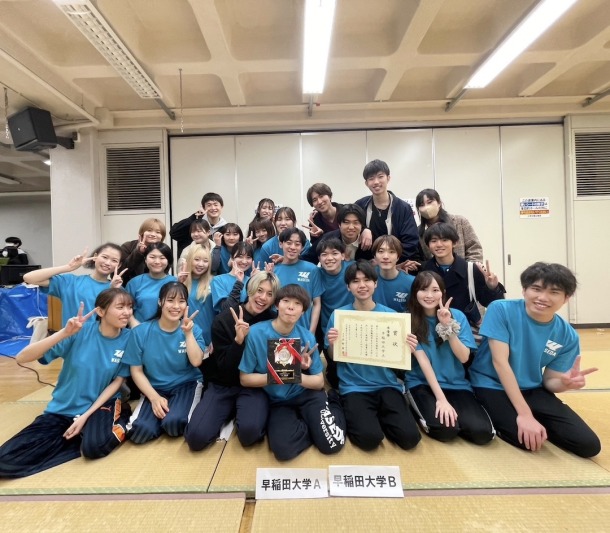
Group photo of the Waseda Karuta Club. Inoue is second from the right in the front row.
--Please tell us your future goals.
My biggest goal is to defend my Queen title. This was my first time competing against the Queen, so it was also my first time to be in a position to defend my title. I want to get through it somehow and aim for consecutive victories.
After graduation, I plan to get a job at an IT consulting company. I've heard that it's a busy industry, so I'm a little worried about whether I'll be able to balance it with karuta, but I've heard that there are people at the company who play competitive karuta, so I'd like to do my best while listening to their advice on how to balance it.
--Finally, please give a message to new students entering this spring.
I want you to find at least one thing that you can feel you have worked hard at during your university life. I think my own student life was very fulfilling, and that's because I feel like I worked hard at everything, including karuta, studying, and part-time work. Whatever the outcome, working hard will give you confidence and lead to you being able to affirm yourself. You don't have to aim for 100% perfection in everything, 80% is fine. First, try to find something that you feel you can work hard at, and enjoy your university life to the fullest!
No.866
Interview, text and photography: Waseda Weekly Reporter (SJC student staff)
School of Human Sciences Graduated March 2024 Risaki Sato
【Profile】
Originally from Toyama Prefecture. Graduated from Koka Gakuen High School. Recipient of the 2023 Waseda University Alumni Association To-kon Award. Naho's hobby is playing games. "I play a wide range of games, from RPGs to smartphone games, and playing games between karuta and research is a great way to unwind. The reason I applied to a science and engineering faculty is because I was interested in programming for game development." (Inoue)
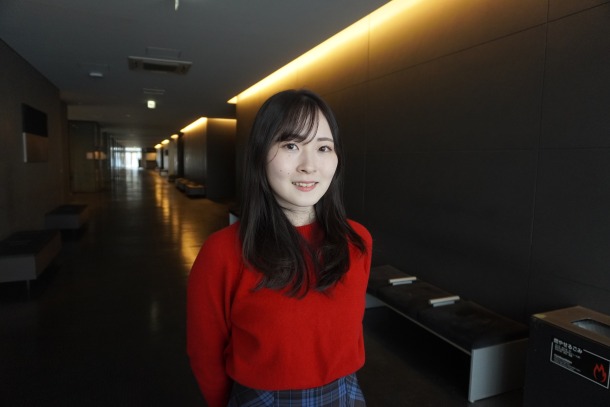
At Nishi-Waseda Campus Building No. 63


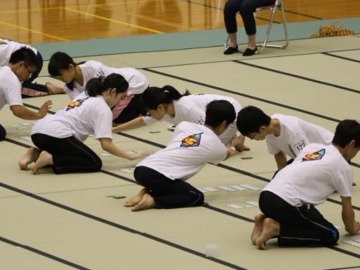
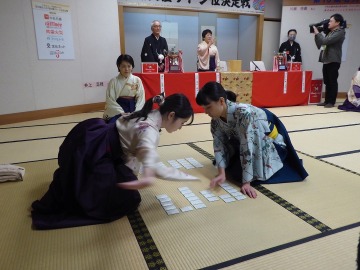
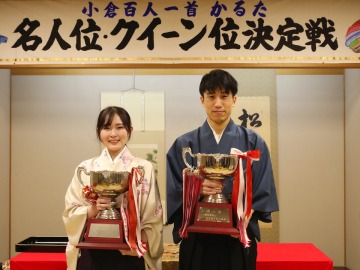
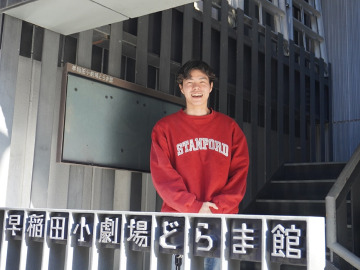
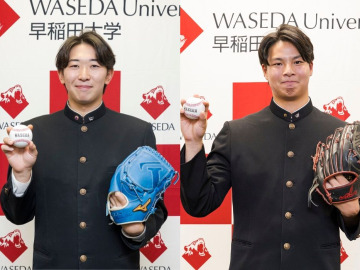
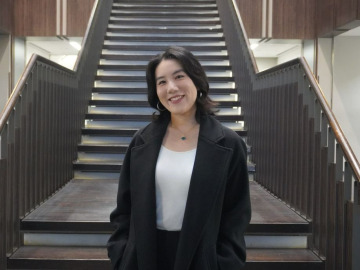
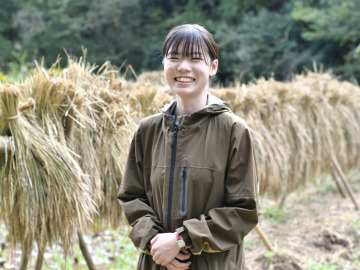

![[Save version] Map of the four main campuses](https://www.waseda.jp/inst/weekly/assets/uploads/2025/09/17cb2975123fc5103172ef60bd98608d-610x458.jpg)

